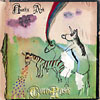 I'm not entirely certain whether CocoRosie should actually be considered a musical group, or just a collection of willful, calculated eccentricities clumsily juxtaposed with each other.
I'm not entirely certain whether CocoRosie should actually be considered a musical group, or just a collection of willful, calculated eccentricities clumsily juxtaposed with each other. The whole existence of CocoRosie represents only the newest in a recent run of decisive victories of style over substance, surface over depth. This sounds like the opening to a very dismissive trashing of the duo's new album Noah's Ark, and perhaps it is, but I also don't want to ignore or downplay the shiny, effervescent superficialities that conspire to create a seductive and undeniably intriguing album (though its intriguing for all the wrong reasons).
CocoRosie are two American sisters who reunited, after a long separation, in Paris; trust-fund babies who caught wind of the freak-folk current typified by Devendra Banhart and the Golden Apples stable. Their first album was a conscious bandwagon-jump, with purposely low-fidelity recordings of the two sisters harmonizing with creepily contrived infantile vocals (a la Joanna Newsom, but without the musical chops), singing along to music-box melodies or clunky programmed rhythms. The Casady sisters appeared in publicity shots in self-consciously retro 1920s European flapper-wear and make-up, looking an awful lot like The Dresden Dolls. Their style has slowly morphed over the past couple years of touring into an almost transcendent form of deliberate tackiness, culminating in the album cover for Noah's Ark, with its crude drawings of unicorns and vomiting zebras gleefully humping under a rainbow projected from a pentagram tattooed on a Care Bear's forehead.
The sisters themselves look terrible, with partial moustaches, mullets, ugly tie-died clothes and clashing Native American jewelry. I'm spending so much time on the visual tactics of CocoRosie because it seems to be at least as, if not more, important than the music itself. This time out, the girls are assisted by French hip-hop beat-boxer Spleen, who provides some clunky, junky, unfunky beats over which the Casady sisters can strain themselves trying to sound like crippled midgets with foetal alcohol syndrome crying for their mothers in a cartoon faerie land. Noah's Ark is the soundtrack to those psychedelic Lisa Frank trapper-keepers that grade-school girls fancied during the My Little Pony-infested 80s. It's studied in its mastery of faux-naive posturing, and in some ways represents a remarkable feat of substance-less, free-floating postmodernity.
Take the album's opening track, "K-Hole," which renders the disassociative experience of Ketamine in nightmarishly jubilant lyrical couplets like: "God will come and wash away/Our tattoos and all the cocaine/And all of the aborted babies/Will turn into little Bambies" and "I dreamt one thousand basketball courts/Nothing holier than sports." I must admit that something inside of me is attracted to such warped surreality, but the song is couched in instantly recognizable Bjork-isms and can't help but seem like a style parody. Other tracks use a similar palette, skeletal melodies and ramshackle beat programming, with vocal multi-tracking and an arsenal of superfluous psychedelic touches, none of it remarkable musically. Several guest stars feature prominently, most notably the recent Mercury Prize winner Antony, who donates vocals to "Beautiful Boyz," a paean to prison sex; and Devendra Banhart, who warbles in Spanish on "Brazilian Sun." Along the way, Diane Cluck, Jana Hunter and some French rapper also make appearances, desperately trying to pad the album with artistic heft, so that no one will notice the undernourished, bulimic 13-year-old girl at the heart of the album. Please, someone feed her and pay attention to her. I can't do it, but somebody really should.
samples:
Read More

